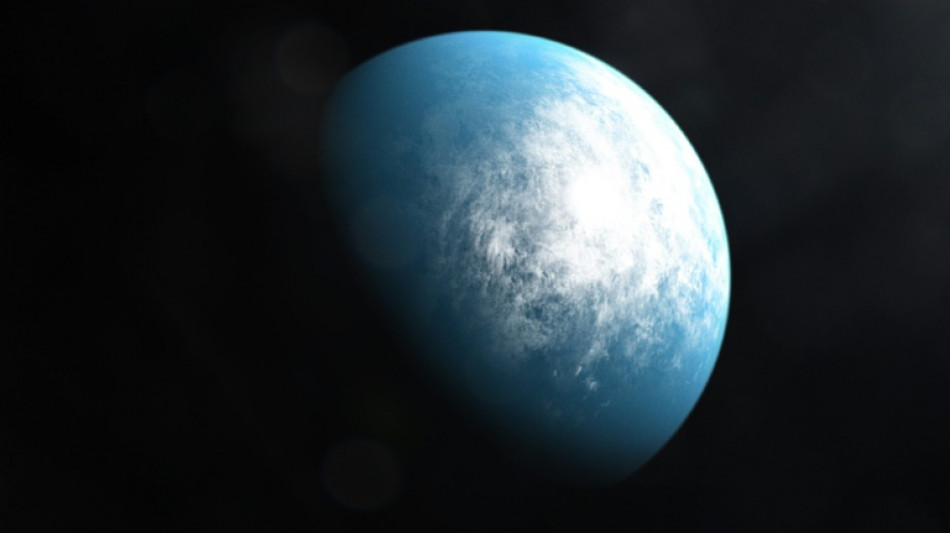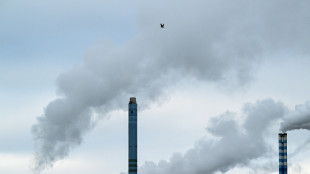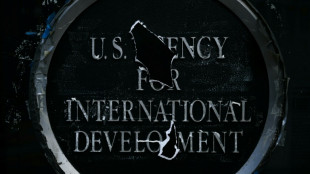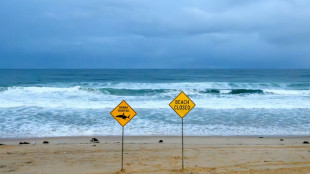
-
 AI reshaping the battle over the narrative of Maduro's US capture
AI reshaping the battle over the narrative of Maduro's US capture
-
Penguins bring forward breeding season as Antarctica warms: study

-
 Vietnam leader pledges graft fight as he eyes China-style powers
Vietnam leader pledges graft fight as he eyes China-style powers
-
Ukrainian makes soldier dad's 'dream come true' at Australian Open

-
 'Timid' Keys makes shaky start to Australian Open title defence
'Timid' Keys makes shaky start to Australian Open title defence
-
Indiana crowned college champions to complete fairytale season

-
 South Koreans go cuckoo for 'Dubai-style' cookies
South Koreans go cuckoo for 'Dubai-style' cookies
-
Harris leads Pistons past Celtics in thriller; Thunder bounce back

-
 Tjen first Indonesian to win at Australian Open in 28 years
Tjen first Indonesian to win at Australian Open in 28 years
-
Long-delayed decision due on Chinese mega-embassy in London

-
 Djokovic jokes that he wants slice of Alcaraz's winnings
Djokovic jokes that he wants slice of Alcaraz's winnings
-
Trump tariff threat 'poison' for Germany's fragile recovery

-
 Tourists hit record in Japan, despite plunge from China
Tourists hit record in Japan, despite plunge from China
-
Jittery Keys opens Melbourne defence as Sinner begins hat-trick quest

-
 The impact of Trump's foreign aid cuts, one year on
The impact of Trump's foreign aid cuts, one year on
-
Belgian court weighs trial for ex-diplomat over Lumumba killing

-
 Inside China's buzzing AI scene year after DeepSeek shock
Inside China's buzzing AI scene year after DeepSeek shock
-
Asian markets sink, silver hits record as Greenland fears mount

-
 Shark bites surfer in Australian state's fourth attack in 48 hours
Shark bites surfer in Australian state's fourth attack in 48 hours
-
North Korea's Kim sacks vice premier, rails against 'incompetence'

-
 Spain mourns as train crash toll rises to 40
Spain mourns as train crash toll rises to 40
-
'Very nervous' Keys makes shaky start to Australian Open title defence

-
 Vietnam leader promises graft fight as he eyes China-style powers
Vietnam leader promises graft fight as he eyes China-style powers
-
Dad-to-be Ruud ready to walk away from Australian Open

-
 North Korea's Kim sacks senior official, slams 'incompetence'
North Korea's Kim sacks senior official, slams 'incompetence'
-
Farewells, fresh faces at Men's Fashion Week in Paris

-
 'I do not want to reconcile with my family' says Brooklyn Peltz Beckham
'I do not want to reconcile with my family' says Brooklyn Peltz Beckham
-
EU leaders take stage in Davos as Trump rocks global order

-
 Blast at Chinese restaurant in Kabul kills 7
Blast at Chinese restaurant in Kabul kills 7
-
Warner hits 'Sinners' and 'One Battle' tipped for Oscar nominations

-
 Colombian paramilitary-turned-peace-envoy sentenced over atrocities
Colombian paramilitary-turned-peace-envoy sentenced over atrocities
-
Gilgeous-Alexander leads Thunder in rout of Cavaliers

-
 Seahawks blow as Charbonnet ruled out for rest of season
Seahawks blow as Charbonnet ruled out for rest of season
-
Kostoulas stunner rescues Brighton draw after penalty row

-
 Man Utd greats tell Martinez to 'grow up' as feud rumbles on
Man Utd greats tell Martinez to 'grow up' as feud rumbles on
-
LeBron James' All-Star streak over as starters named

-
 Allies tepid on Trump 'peace board' with $1bn permanent member fee
Allies tepid on Trump 'peace board' with $1bn permanent member fee
-
Ninth policeman dies in Guatemala gang riots, attacks

-
 Man City's Foden to play through pain of broken hand
Man City's Foden to play through pain of broken hand
-
Milan Fashion Week showcases precision in uncertain times

-
 Public media in Europe under unprecedented strain
Public media in Europe under unprecedented strain
-
Africa Cup of Nations refereeing gets a red card

-
 Tributes pour in after death of Italian designer Valentino
Tributes pour in after death of Italian designer Valentino
-
Bills fire coach McDermott after playoff exit: team

-
 Chile wildfires rage for third day, entire towns wiped out
Chile wildfires rage for third day, entire towns wiped out
-
Valentino, Italy's fashion king who pursued beauty at every turn, dies at 93

-
 France PM to force budget into law, concedes 'partial failure'
France PM to force budget into law, concedes 'partial failure'
-
Allies tepid on Trump 'peace board' with $1bln permanent member fee

-
 'My soul is aching,' says Diaz after AFCON penalty miss
'My soul is aching,' says Diaz after AFCON penalty miss
-
Ex-OPEC president in UK court ahead of corruption trial


Nearby exoplanet could be first known ocean world: Webb telescope
A planet relatively close to Earth could be the first ever detected with a potentially life-sustaining liquid ocean outside our Solar System, according to scientists using the James Webb space telescope.
More than 5,000 planets have been discovered outside of the Solar System so far, but only a handful are in what is called the "Goldilocks zone" -- neither too hot or too cold -- that could host liquid water, a key ingredient for life.
The exoplanet LHS 1140 b is one of the few in this habitable zone, and has been thoroughly scrutinised since it was first discovered in 2017.
It sits 48 light years from Earth, which equates to more than 450 trillion kilometres (280 trillion miles) -- relatively close in the vast distances of space.
The exoplanet had been thought to be a small gas giant called a "mini-Neptune" with an atmosphere too thick with hydrogen and helium to support alien life.
However, new observations from the Webb telescope have confirmed that the exoplanet is in fact a rocky "super-Earth".
It is 1.7 times bigger than Earth, but has 5.6 times its mass, according to a study published late Wednesday in The Astrophysical Journal Letters.
- 'Best bet' for ocean world -
The Webb telescope was able to analyse the planet's atmosphere as it passed in front of its star.
There were no signs of hydrogen or helium, which ruled out that the planet was a mini-Neptune.
The density of the planet indicates that it "actually has large quantities of water," study co-author Martin Turbet of France's CNRS scientific research centre told AFP.
It could be a truly immense amount of water.
All the water in Earth's oceans represent only 0.02 percent of its mass. But 10 to 20 percent of the exoplanet's mass was estimated to be water.
Whether or not this water is in liquid or ice form depends on the planet's atmosphere.
"We do not have direct evidence that it has an atmosphere, but several elements point in that direction," Turbet said.
Lead study author Charles Cadieux, a PhD student at the University of Montreal, said that "of all currently known temperate exoplanets, LHS 1140 b could well be our best bet to one day indirectly confirm liquid water on the surface of an alien world".
One positive is that the planet is gently warmed by its red dwarf star, which is one-fifth the size of the Sun.
The exoplanet's surface temperature should be fairly similar to that on Earth and Mars, Turbet said.
The presence of gasses such as carbon dioxide will play a key role in determining whether the planet is covered in ice or water.
- Bull's-eye ocean -
One possibility is that the surface is mostly ice, but there is a vast liquid ocean where the planet is most exposed to its star's heat.
This ocean could measure about 4,000 kilometres in diameter, around half the surface area of the Atlantic Ocean, modelling suggested.
Or the liquid water could be hidden under a thick shell of ice, like on the moons Ganymede, Enceladus or Europa orbiting around Jupiter and Saturn.
Webb's instrument spotted signs that suggest "the presence of nitrogen," Cadieux said, adding that more research was needed to confirm the finding.
Nitrogen is found everywhere on Earth, and is thought to be another potentially ingredient for life.
The researchers are hoping to get a few more hours of the Webb's telescope's precious time to find out more about LHS 1140 b.
It will take at least a year to confirm whether the exoplanet has an atmosphere, and two or three more to detect the presence of carbon dioxide, the researchers estimated.
G.Schmid--VB



